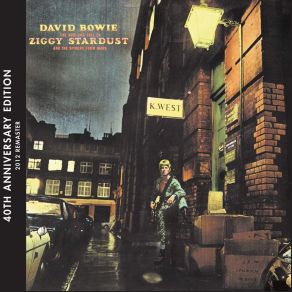The Rise and Fall of Ziggy Stardust and the Spiders from Mars (40th Anniversary Edition)
Download links and information about The Rise and Fall of Ziggy Stardust and the Spiders from Mars (40th Anniversary Edition) by David Bowie. This album was released in 1972 and it belongs to Rock, Glam Rock, Hard Rock, Punk, Heavy Metal, Pop, Alternative, Songwriter/Lyricist genres. It contains 11 tracks with total duration of 38:32 minutes.

|
|
|---|---|
| Artist: | David Bowie |
| Release date: | 1972 |
| Genre: | Rock, Glam Rock, Hard Rock, Punk, Heavy Metal, Pop, Alternative, Songwriter/Lyricist |
| Tracks: | 11 |
| Duration: | 38:32 |
| Buy it NOW at: | |
| Buy on iTunes $9.99 | |
Tracks
[Edit]| No. | Title | Length |
|---|---|---|
| 1. | Five Years | 4:43 |
| 2. | Soul Love | 3:34 |
| 3. | Moonage Daydream | 4:40 |
| 4. | Starman | 4:14 |
| 5. | It Ain't Easy | 2:57 |
| 6. | Lady Stardust | 3:21 |
| 7. | Star | 2:47 |
| 8. | Hang On to Yourself | 2:39 |
| 9. | Ziggy Stardust | 3:13 |
| 10. | Suffragette City | 3:26 |
| 11. | Rock 'N' Roll Suicide | 2:58 |
Details
[Edit]Borrowing heavily from Marc Bolan's glam rock and the future shock of A Clockwork Orange, David Bowie reached back to the heavy rock of The Man Who Sold the World for The Rise and Fall of Ziggy Stardust and the Spiders from Mars. Constructed as a loose concept album about an androgynous alien rock star named Ziggy Stardust, the story falls apart quickly, yet Bowie's fractured, paranoid lyrics are evocative of a decadent, decaying future, and the music echoes an apocalyptic, nuclear dread. Fleshing out the off-kilter metallic mix with fatter guitars, genuine pop songs, string sections, keyboards, and a cinematic flourish, Ziggy Stardust is a glitzy array of riffs, hooks, melodrama, and style and the logical culmination of glam. Mick Ronson plays with a maverick flair that invigorates rockers like "Suffragette City," "Moonage Daydream," and "Hang Onto Yourself," while "Lady Stardust," "Five Years," and "Rock 'n' Roll Suicide" have a grand sense of staged drama previously unheard of in rock & roll. And that self-conscious sense of theater is part of the reason why Ziggy Stardust sounds so foreign. Bowie succeeds not in spite of his pretensions but because of them, and Ziggy Stardust — familiar in structure, but alien in performance — is the first time his vision and execution met in such a grand, sweeping fashion.